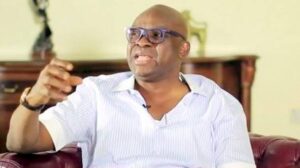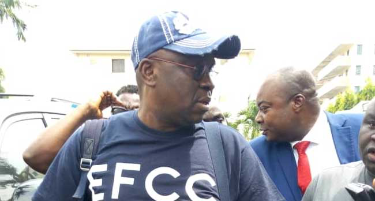The Federal High Court in Lagos, presided over by Justice Chukwujekwu Aneke, continued the trial of former Ekiti State Governor, Ayodele Fayose, who faces charges of alleged N6.9 billion fraud and money laundering. The trial resumed on Monday, with the court hearing testimony from the 13th prosecution witness, Abubakar Madaki, a former operative of the Economic and Financial Crimes Commission (EFCC).
During his testimony, Madaki revealed that Fayose did not personally conduct any of the financial transactions related to the charges. This point was highlighted during the cross-examination by the second defense counsel, Olalekan Ojo (SAN), who asked Madaki to review Exhibit D12 and confirm whether Fayose had made any of the relevant transactions. Madaki responded unequivocally, “There is none.”
The defense counsel further questioned Madaki about his previous statements to the court, in which he admitted not witnessing any of the transactions firsthand. Madaki clarified, “I only said it was in the course of investigation.” He affirmed that his actions during the investigation were based on factual information provided to him by individuals who either saw or participated in the transactions. “Yes, very well my lord,” Madaki said when asked if his investigation was rooted in facts. He also confirmed that these facts were derived from statements and documents recovered during the investigation.
One significant line of questioning involved a person named “Erukaa,” from whom a statement had been obtained during the investigation. The defense counsel asked Madaki to confirm whether Erukaa was in Abuja on the same day that another prosecution witness, Senator Musiliu Obanikoro, claimed to be there. However, the prosecution counsel objected to this line of questioning, arguing that Madaki could not testify about the extra-judicial statement of Erukaa, who had since passed away and was not a party to the case. Erukaa had served as a Special Assistant to Fayose.
 The defense also probed the issue of whether Fayose had acknowledged receiving any amount of dollars from Obanikoro. Madaki replied that there was no document indicating such an acknowledgment.
The defense also probed the issue of whether Fayose had acknowledged receiving any amount of dollars from Obanikoro. Madaki replied that there was no document indicating such an acknowledgment.
Under further cross-examination by the first defense counsel, Senior Advocate of Nigeria, Mr. Ola Olanipekun, Madaki was asked to confirm his earlier testimony that N4.6 billion had been transferred from the office of the National Security Adviser (NSA) to an entity named Sivan Macnamara. Madaki affirmed, “Yes.” He explained that the funds were transferred from the NSA’s imprest account to the Diamond Bank account of Sivan Macnamara.
Olanipekun then asked Madaki to clarify whether the funds were intended for Fayose. Madaki responded, “I never said transfer; I said it was meant for the first defendant.” He further explained that investigations revealed the money was given in cash to avoid traces, suggesting that the funds were intended to disguise their origin. Madaki denied that the funds were proceeds of drug trafficking, stating, “The money was not proceeds of drugs.”
Throughout the proceedings, the defense aimed to cast doubt on the prosecution’s case by highlighting the lack of direct evidence linking Fayose to the financial transactions and by questioning the reliability of the investigation. The prosecution, represented by Rotimi Jacobs (SAN), maintained that the evidence gathered during the investigation was sufficient to support the charges against Fayose and his company, Spotless Investment Ltd.
Justice Aneke adjourned the trial until July 19, 2024, allowing for further examination of the evidence and continuation of the cross-examination of witnesses. The court’s decision on this high-profile case is keenly awaited, as it carries significant implications for the ongoing fight against corruption in Nigeria.
As the trial progresses, both the prosecution and defense continue to present their arguments, seeking to establish the veracity of their respective claims. The outcome of this case will be closely watched, given its potential impact on the political landscape and the broader anti-corruption efforts in the country.




